Dweezil Zappa - Interview
by Lisa Torem
published: 31 / 10 / 2017
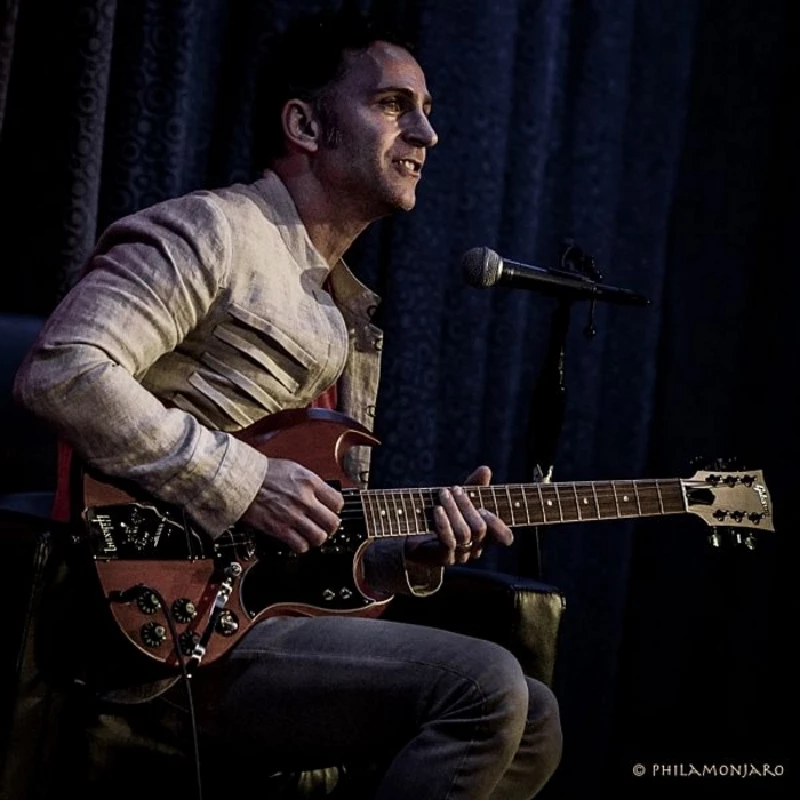
intro
American guitarist/composer/actor Dweezil Zappa chats to Lisa Torem about his forthcoming UK tour and his father Frank's legacy
2017 has been a typically creative, although perhaps an exasperating year, for American guitarist/composer/actor Dweezil Zappa, the son of the late American composer/guitarist and record label owner, Frank Zappa. Dweezil has been a staunch supporter of his father’s repertoire and has made a commitment to remain, as one fan called him, “a keeper of the flame,” by performing fully, orchestrated interpretations of his father’s extensive catalogue. But his career is not only about keeping alive his father’s legacy. Dweezil also writes and performs his own original compositions and makes it a point to offer master classes for legions of ambitious guitar students. He would most likely be the first to admit that he enjoys challenging himself technically, and joyfully shares his expertise with many of his fans. He has performed with Zappa Plays Zappa since 2006 and has acted in numerous American TV programmes. An early guitar enthusiast, Dweezil was mentored by Steve Vai and Eddie Van Halen, who produced his first single when he was only twelve. But, as stated earlier, this has been one busy and productive year. In spring, Dweezil recorded and produced ‘Dinosaur’, which included an evocative electric guitar solo by his dad, honed from live concert tracks and finally edited down to synch up with Dweezil’s fiery arrangement. He also offered “Search and Destroy” classes in July over the course of his legendary Dweezilla Music Boot Camp; with the focus this year on ensemble performance. And in keeping with the tradition of illuminating his father’s career, Dweezil made a point to demonstrate “key elements” that Frank had used in composing his own tracks. This year, he also tried something completely new which allowed him a more immediate access to his legion of fans. His 'What’s in a Name? – Storytelling with guitar accompaniment, Q & A Tour' in North America took place in City Winery Chicago, Nashville, Atlanta and New York and Ardmore Music Hall, in Pennsylvania; plus, he also wrapped up the North American 'Dweezil Zappa: 50 Years of Frank' tour on August 11th and has been coping with an ongoing familial legal suit regarding the use of Frank Zappa’s name—thus the aforementioned exasperation! Whilst fielding these matters and events, Dweezil and band are in the midst of planning an extensive UK tour in October, where his band has not toured for several years, and where he’ll be introducing new band members plus “a few surprises.” I’ve had the pleasure of meeting Dweezil several times and have always appreciated his ability to communicate, whether through his shiny SG or with a welcoming smile. I last saw him at a Master Class in Chicago, where he fielded queries from eight-year olds as well as the odd, nostalgic hippie longing to see if Frank’s oldest son possessed all the right stuff. He was as effusive with the youngster as he was with the nostalgic voyeur. If you’ve met Dweezil you know that he’s a warm soul loaded with talent and armed with discipline who makes little fuss about either set of tools. Pennyblackmusic caught up with Dweezil Zappa on the day preceding the great lunar eclipse of 2017; he was on his way to the airport. He stopped speaking for a moment as he loaded his baggage onto a cart and then when his ride rammed through a noisy tunnel, but other than that, we had a lively road trip of a conversation about his latest tours and his process of creating exceptional music: the jarring stops and starts notwithstanding. Dweezil starts off by explaining that, “The American tour finished about a week ago in Flagstaff, and we’re having rehearsals that are starting for the European tour in about a week.” I had browsed through the list of venues that he would be performing in during the upcoming UK tour in October. Some looked like ancient castles cradled by the sea shore; others were sleek and contemporary. Had Dweezil been there before? Did they hold special meaning for him? “I think I’ve been to most of them,” he says, pausing. “I don’t have the venues in front of me. I know the Sage Gateshead is a great venue; we’ve been there before. I enjoyed that one and The Royal Festival Hall is a cool venue. We played there last time, and my dad has played there a few times. It’s fun and there’s the history of the same building; the same stage; it’s like the ghost of the music in the room.” (I was tickled to read that Romantic period composer Felix Mendelssohn once played the Town Hall organ in Birmingham; he, like Dweezil, began seriously creating music (specifically string symphonies) at the age of twelve, as well.) I mention Mendelssohn’s appearance as an aside, but Dweezil is on to the practicalities of running a show. “There’s a place, The Lowry, in Manchester, I’m not sure if we played there before. I think it will be nice to play there. It depends. Sometimes the venues that are set up for orchestral stuff don’t necessarily sound great for a rock and roll band just because the acoustics of the room are designed to amplify things from the stage in a way that’s good for acoustic instruments, but not great for the loud electric instruments.” Not surprisingly, Dweezil’s music attracts many exploratory musicians. That said, people may come and go as in any band. But then, this music demands extreme commitment; not everyone has what it takes. I ask Dweezil to fill me in on the current line-up, which includes long-term players, such as multi-instrumentalist Scheila Gonzalez (2006), bassist Ken Morgan (2012) and drummer Ryan Brown (2013). “In this version of the band, we have a new guy joining us for this tour, Adam Minkoff and we have another female singer, Cian Coey, so those are the two newest people in the band for his tour.” I’m curious about how Dweezil views the addition of vocal arrangements. Is that his preference these days; after all, he prides himself on being an instrumentalist. “With this version of the band, there’s definitely more of a range of possibilities for vocal things. There are some records that my dad did that were very, very heavy on the vocals, like ‘Joe’s Garage’ and ‘You Are What You Is’. We can recreate the fullness of that kind of vocal arrangement and we’re looking at other surprise elements, something that we’ve never played before, that are from the early Mothers' era, maybe some doo wop stuff, so there’s a few things we’ll start thinking about when we get into rehearsal, but definitely this version of the band has the most vocal potential of any style.” Dweezil painstakingly listened to his father’s arrangements without benefit of an actual score. But how long does it take to impart this knowledge to his players? How intensive are the rehearsals? I say to him, “This is complicated music.” “For sure. This is really hard music. It’s rewarding for people to learn it and perform it, but it takes a considerable amount of time. A typical rehearsal day is 11 to 6 and we’ll probably have a little more of a week rehearsal for the people on the tours, and they’ll be coming in to do their homework stuff, and when we get to the UK, we’ll have another rehearsal there, too." Wow. I’m wondering about his own vault of twists and turns. Will he incorporate solo work into his upcoming tours? “It’s a possibility. I haven’t really figured out exactly what’s going to be in the show. There are songs we can throw in if I decide that they are worth doing. Maybe a song like ‘Dragon Master’ which I co-wrote with my dad or possibly an instrumental or something but I haven’t decided, yet.” “Decided yet?” Dweezil never stands in one place. When would that even happen? He adds: “Later in the year, though, in late November I’m doing a couple of concerts in Holland where I’ll be doing my own orchestral music with a 100-piece orchestra. I am working on more of my own new music and doing things that are heading in that direction so I can have fun being creative in that way. I’m intrigued with his one-off ‘Dragon Master’, which he reminded us is a co-write with his dad, which I think makes it unique for that reason alone, but what’s it like performing that live? I can almost hear him smile through the crackling of the phone. “It’s a completely over the top, out of control, in-your-face metal song which is not something that my dad did as a normal style of music. He wrote these preposterous, heavy metal lyrics and thought they were so funny and said, ‘You should write the music to this.’ He suggested that it would be authentic to the style of metal because - this was back in 1987 or ’88 or somewhere around there when he wrote the lyrics - and so they were doing quite a lot of hard rock and metal music that was popular on the charts and on the radio. So, I decided when I finally put this version of the song out, I wanted it to be a combination of classic metal elements.” “So really the fun part of the song is that the lyrics are ridiculous but the music blended to life in a serious way. If you were a real metal fan, you wouldn’t hear a joke — it’s just standard protocol. There are dragons and all kinds of stuff in metal, all of the time. It’s funny, but if you’re not a metal fan the joke is much more obvious.“ I, like so many Dweezil aficionados, am hung up on ‘Via Zammata’, one of Dweezil’s most excellent displays of orchestral work. But I want to know how he tackles bringing such a work, and similarly written pieces, to life. I ask him to break down the elements; how does he convey the intensity of a multi-layered piece in a live setting? And how important is it to him to work at this level? “The orchestral stuff that we do later in the year came about because a friend of mine works with The National Dutch Orchestra. And so he suggested, ‘Hey, why don’t you do a concert of your own music with some of your dad’s music so the concert is called 'Dweezil Zappa’s Orchestral Favorites'.” “I wanted to write some new music specifically because I’ve never had the opportunity to write for a 100-piece orchestra. It’s just like an army that you get to lead. There are a lot of people on stage and so the way that I’ve gone about writing music is, I want to have, at least with the main piece, which is untitled still - the longer piece; it’s almost like going through the soundtrack of a movie. It’s a thrill ride experience. But the challenge of writing that way is, for me, that I don’t actually do it in the conventional way, where you get a pen and write it on a paper, I do something similar to what my dad did before he knew how to do all of that stuff.” “When he was a kid he used to draw pictures of musical things that looked like music. They always had a contour or shape to them. So what I do actually is I used the computer to do music and I first start out by drawing shapes and contours and then when I can hear what it sounds like, I start adjusting it be what I want. Then the computer, itself, will be able to spit out the notes for the musicians to read. So even though I’m not writing it on paper in the conventional way, it will end up that way.“ I’m wondering if Dweezil can detect my puzzlement over the phone. He clarifies. “It’s an artistic approach of looking at shapes and patterns on the screen and then that translates to notes because of how it works. So on the computer, you can basically decide, okay, I want a minute’s worth of sixteenth notes and you take a pencil and draw it into a shape and depending on what that shape looks like, you can listen to it and decide, ‘Oh, I want to change some of these notes’ and then change the shape.” “The thing about doing it that way is that I end up writing it as though I had an instrument in my hand because when you write based on something you’re familiar with, that informs the decision-making process. It’s totally free and allows me to do things that I wouldn’t consider.” I think I get it now. I’m grateful for the vivid explanation, and he has piqued my interest further. I venture out: “Do you have a preference for particular textures when working with an orchestra?” “My favorite textures vary - I do like the brass stuff and I like the strings, but I also like the bassoon. I think it’s a really interesting instrument, and the oboe. And then there are some interesting percussion elements.” “This piece has a section where it’s designed so that one part of the orchestra will be playing something and the other side will be playing something different, almost like two pieces and they collide in the centre. So there are a couple of strange moments like that where it sounds unusual, almost like the sound of the Doppler Effect, like when an ambulance goes by or something like that.” “There are some strange elements also in the melodic part and there are also some peculiar dissonant elements.” I’m stunned by the complexity of these works, and yet how seamless they will appear to be when played live. Is Dweezil a masochist? “The pieces I mentioned earlier are not pieces we’re going to be playing on this tour, but as far as the difficulty of my dad’s, there is a huge amount of stuff that we’ve done over the years that are specifically the hardest thing. Next year we’re considering doing a tour where the whole of the tour will be based on playing the hardest songs, which will be played in one show. We’ll just call it, ‘The Hard One’.” “There are a lot of challenges for me as far as playing the guitar; when there is material that wasn’t meant to be played on the guitar and doesn’t fit nicely on the guitar, so even a song like ‘Inca Roads’ (The Mothers of Invention, ‘One Size Fits All,’ 1975), that doesn’t play well on the guitar — it was written for the marimba, but it’s extra, extra hard on guitar and it’s never been played before by anyone in the band. As mentioned in the introduction, Dweezil recently performed an up-close and personal show, 'What’s in a Name?' where he showed off some tasty guitar bits and responded to questions about his upbringing and musical and filmic career. He handled the solo forum with grace and humour. I wondered, however, how this idea came about and whether, at the end of the day, it was as rewarding as his other performances? Dweezil seemed delighted to be asked. “What happened over the years is that I played my dad’s music over the years and after the shows we got to meet a lot of the fans. People have a lot of questions and so I thought, maybe it would be a good idea to integrate that element, where people have an opportunity to ask questions in perhaps more detail. So the impetus to do that was to create a dialogue and an interactive kind of experience. I think people did end up having a good time and hearing some stories about things they wouldn’t have heard otherwise.” I was there in Chicago for the show. I found Dweezil to be very candid and personable. The stories ranged from bittersweet to downright hilarious. It seemed like an obvious question…”Would you consider compiling those stories and creating a memoir?” Dweezil took his time answering. “I’ve actually considered writing a book. It’s not something I had actually considered before; writing in that way. And writing about yourself, it’s hard as that person and you think, why would anybody want to read it?” “The experience of doing a show like the 'What’s in a Name?’ tour; people are interested in some of those stories, which makes it a little easier to think about how to put a book together, but when you think, ‘Hey, I’m going to write a book about my life,’ that’s a thoroughly narcissistic concept. I’m always cautious and ask, is there a reason for this to exist?” I explain to him that his stories, from my perspective, were universal. “You talked so naturally about cats eating off the counter in your home and other stories that brought to life your very artistic, often chaotic household. I think you touched on things that the rest of us can relate to.” Dweezil backpedals. Perhaps he doesn’t realize that his audience admires him for sharing intimate details of his life, when he surely doesn’t have to; after all, he’s a guitarist and composer — story telling is a whole new game. “I appreciate your perspective on that, because as I said, when it’s your personal experience, if you have any kind of introspection at all, you would be asking yourself, what would be the point of sharing those experiences? But people seemed to have a good time, and we’ll have to give it a shot.” I’m wondering if this particular audience is one that makes him feel that he can open up. Is it because we’re all Americans? “Is this the kind of show you might bring to the UK or is this more of an American-based project?” I blurt out. “Yes, if there were a viable way to do it; depending on the venues. I enjoyed the experience. At some of the shows, my wife was actually the mediator. In Chicago, we had a friend as an on-stage moderator.” I comment on his use of his guitar; the way he brought it out to illustrate a humorous or sad anecdote, and the manner in which he used it to mask the salient part of a popular theme song. “I think we had fun when you kept us in suspense, playing certain segments of popular music; not allowing us to hear the whole piece until we exhausted our guesses. You’ve had a lot of experience conducting master classes. Is this something you still enjoy doing?” I ask. “Yes, I’m still doing master classes. As a guitar player, I always like to learn new things. It’s fun to share; that’s inspiring. When I learn something new, I’m excited about it. ‘Hey, everybody, check this out.’” Dweezil will be at the airport soon and we will have to wrap up. What of his current musical tastes? “So who are you listening to now?” I inquire. “Or do you hole up ahead of a tour and just concentrate on the material at hand?” “I think it really depends. It changes. One of my inspirations for trying to do work that I can translate to guitar is Ivo Papazov, a clarinet player from Bulgaria. He plays crazy, crazy stuff on the clarinet and I’d like to learn to adapt that to a guitar style.” That takes guts, I think, but I merely comment: “I’d say you’re pretty fearless when it comes to musical tastes. So anything’s game?” “Yeah, and that’s kind of the way that my dad operated. His M.O. was anything, at any time, for any reason at all. I just grew up with that — there are no boundaries.” We both say thanks, as Dweezil steps out of the car and into another busy airport. Dweezil Zappa will be playing dates across the UK in October. Photos by Philamonjaro www.philamonjaro.com
Band Links:-
https://www.dweezilzappa.com/https://www.facebook.com/DweezilZappaOfficial/
https://twitter.com/DweezilZappa
Picture Gallery:-
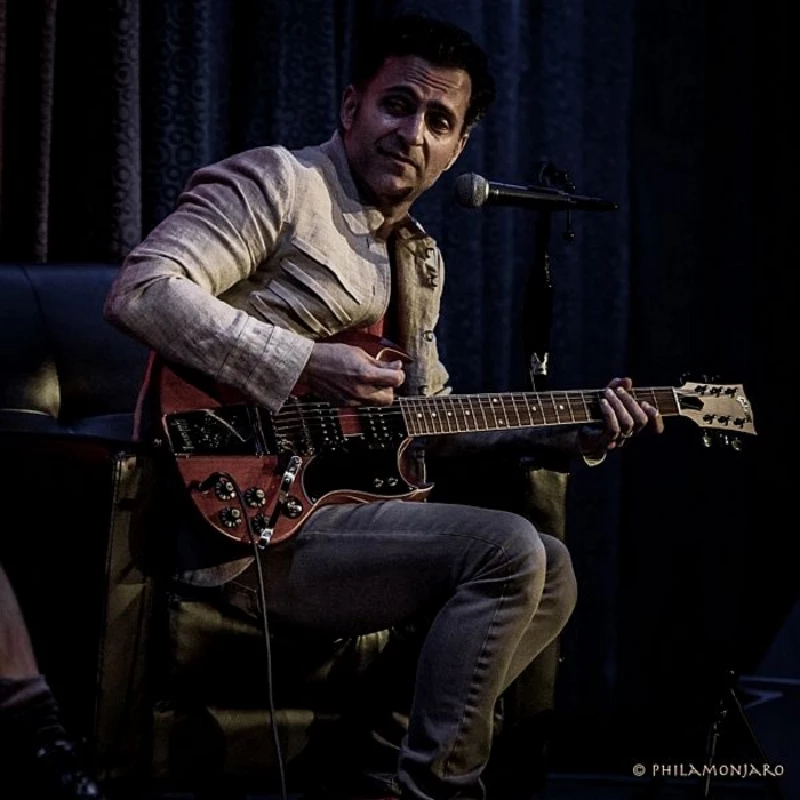
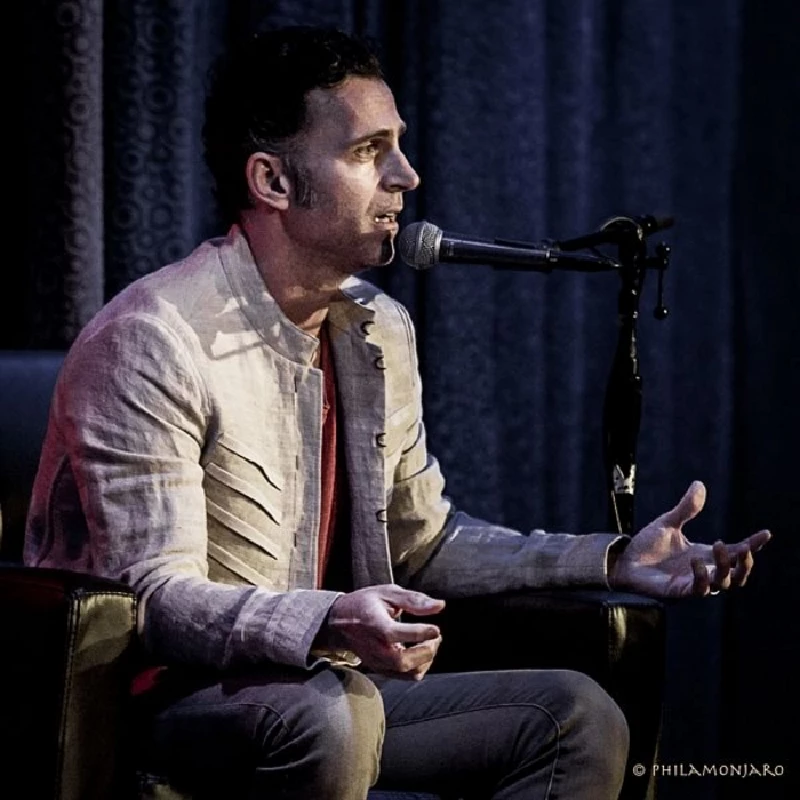
interviews |
|
Interview (2011) |
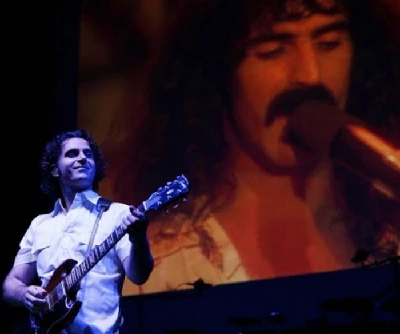
|
| Lisa Torem talks to American guitarist Dweezil Zappa about his Zappa on Zappa project, which will be touring the UK in November and pays tribute to his late father, the legendary Frank Zappa |
live reviews |
|
City Winery, Chicago, 7/7/2017 |

|
| American guitarist and educator Dweezil Zappa entertains fans at City Winery Chicago with delightful stories about his father, formative career and more, using his red SG for effect. |
| Chicago Music Exchange, Chicago, 10/10/2013 |
| Royal Concert Hall, Nottingham, 12/11/2012 |
soundcloud
reviews |
|
Return of the Son of... (2010) |
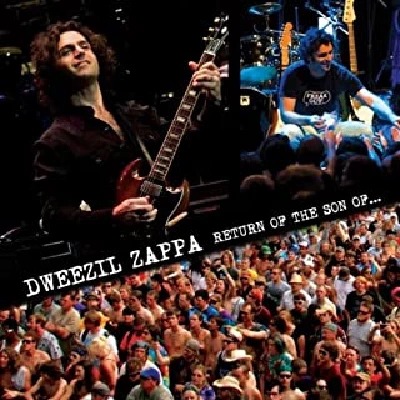
|
| Exhilirating and provocative double CD collection of covers from Dweezil Zappa of his late father Frank's work |
most viewed articles
current edition
Carl Ewens - David Bowie 1964 to 1982 On Track: Every Album, Every SongArmory Show - Interview with Richard Jobson
John McKay - Interview
Colin Blunstone - Thalia Hall, Chicago, 16/7/2025
Billie Eilish - O2 Arena, London, 10/7/2025
Bathers - Photoscapes 1
Loft - Interview
Visor Fest - Valencia, Spain, 26/9/2025...27/9/2025
Sir Tim Rice - Interview
Robert Forster - Interview
previous editions
Manic Street Preachers - (Gig of a Lifetime) Millennium Stadium, Cardiff, December 1999Heavenly - P.U.N.K. Girl EP
Beautiful South - Ten Songs That Made Me Love...
Oasis - Oasis, Earl's Court, London, 1995
Peter Perrett - In Dreams Begin Responsibilities Interview Part One
Boomtown Rats - Ten Songs That Made Me Love....
Coldplay - Wembley Arena. London, 16/8/2022
Prolapse - Interview
Pixies - Ten Songs That Made Me Love...
Trudie Myerscough-Harris - Interview
most viewed reviews
current edition
Davey Woodward - Mumbo in the JumboSick Man of Europe - The Sick Man of Europe
Lucy Spraggan - Other Sides of the Moon
Amy Macdonald - Is This What You've Been Waiting For?
Phew, Erika Kobayashi,, Dieter Moebius - Radium Girls
Suzanne Vega - Flying With Angels
Bush - I Beat Loneliness
Alice Cooper - The Revenge of Alice Cooper
Cynthia Erivo - I Forgive You
Blueboy - 2
Pennyblackmusic Regular Contributors
Adrian Janes
Amanda J. Window
Andrew Twambley
Anthony Dhanendran
Benjamin Howarth
Cila Warncke
Daniel Cressey
Darren Aston
Dastardly
Dave Goodwin
Denzil Watson
Dominic B. Simpson
Eoghan Lyng
Fiona Hutchings
Harry Sherriff
Helen Tipping
Jamie Rowland
John Clarkson
Julie Cruickshank
Kimberly Bright
Lisa Torem
Maarten Schiethart